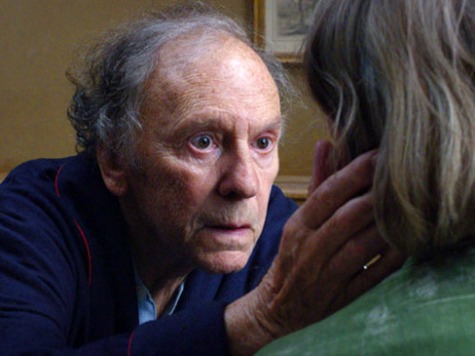Yesterday’s Oscar nominations gave us a few major surprises. From the snub of Oscar-winning director Kathryn Bigelow (“Zero Dark Thirty”) to the exclusion of Ben Affleck (“Argo”) in the directorial race, many critics were wondering what the Academy was thinking.
One thing that they must have been thinking about was the film “Amour,” which surprised critics and audiences alike by receiving five nominations (including for Best Director and Best Picture). And although the movie is still an underdog in most categories, it has a solid shot at several big awards because of the delicacy in which it handles the stirring subjects of aging and romance.
The story focuses on a married couple in their 80s, who are warmly played by Jean-Louis Trintignant and Emmanuelle Riva. Near the beginning, the two are sharing a lovely but quiet meal together when Anne (Riva) suddenly becomes quiet, her face locked in a blank stare that her husband Georges (Trintignant) doesn’t understand. She was playing a practical joke, he assumes when she returns back to her normal self a few moments later.
But no. Something has changed.
The stroke that she suffered only hints at the health issues that Anne faces as her husband takes care of her, standing by her side as her condition worsens. “You inflict nothing on me,” he tells her when she knows otherwise. She is weak and grows weaker by the day. He carries the burden for both of them as they face the inevitable pain of aging and loss. carrying the burden for both of them.
Several years ago, I worked at an assisted living facility and watched as older people faced an inevitable decline in their health and their faculties. The grand thing about “Amour” is how true it rings. Aging isn’t like an injury. It’s not like a concussion an athlete experiences on the field, only to recover from a few days later. It’s a slow and painful departure from the normal way of doing things into an acceptance of a new, harsher reality where actions take longer than they did before and pain never seems to go away.
Anne faces such a scenerio. She becomes paralyzed on her right side. She remains in bed for a long time and fails to wake up in the middle of the night to go to the bathroom. This is aging in the film and the complexities that arise with it are shown clearly and unflinchingly in a script by writer/director Michael Haneke.
The characters are flawed and sometimes resistant to the help they are offered. Anne never wants to go back to the hospital after her first trip there and Georges coldly writes off his own daughter’s support (“Your concern is no use to me,” he says). But through it all, “Amour” captures the pain and perils of aging in a way that will be hard to forget. One development in the third act did surprise me (and not in a good way)but for most of the film, the story looks and feels very real.
Films like “Amour” are hard to watch because they so honestly–removingpretense and self-pity–examine the heartbreak of the aging process. The movie pales in comparison to Sarah Polley’s 2006 drama “Away from Her” but is still well worth seeing for the honesty and sobriety it shows in taking on such a difficult subject.

COMMENTS
Please let us know if you're having issues with commenting.